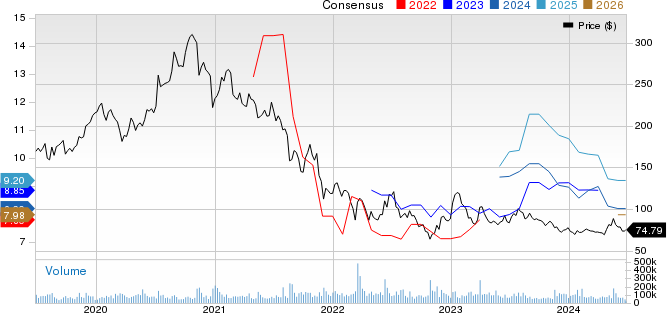Alibaba is on a relentless quest to propel technological innovation fueled by generative AI. In the final quarter of fiscal 2024, AI-related revenues surged by triple digits compared to the previous year.
Continuing this trajectory, Alibaba’s cloud division, Cloud Intelligence Group, recently introduced the “AI programmer,” leveraging the company’s proprietary large language model (LLM).
The AI programmer amalgamates software architect, development engineer, and test engineer functions to aid developers in truncating application development timelines, at times to mere minutes.
Alibaba’s ambition is to cement a strong foothold among individual and corporate developers through the AI programmer, further enriching Alibaba Cloud Intelligence Group’s overall repertoire.
Alibaba Group Holding Limited Price and Consensus
The generative AI market is projected to reach $36.06 billion by 2024 and escalate to $356.10 billion by 2030, reflecting a staggering compound annual growth rate of 46.5% from 2024 to 2030, according to a Statista report. Alibaba is strategically positioned to capitalize on this robust growth trend with its expanding suite of generative AI-driven offerings.
Recently, Alibaba unveiled Qwen2.5, an enhanced version of its line of LLMs, Tongyi Qianwen. Qwen2.5 showcases significant enhancements in reasoning, code comprehension, and textual understanding, delivering compelling outcomes for programmers.
Moreover, Alibaba revamped Model Studio, its AI model, and application development platform, to offer a broader array of models and sophisticated AI tools. Developers now have access to over a hundred models from AI firms like Baichuan AI, with the platform integrating an open-source framework for application development.
Noteworthy is Alibaba’s introduction of Tongyi Lingma, its AI programming assistant, which enhances software development efficiency, slashing test code implementation time by over 70% and saving developers countless hours of manual labor.
Stiff Competition Challenges Alibaba
Despite Alibaba’s strides in the generative AI space, it faces formidable competition from the likes of Microsoft, Amazon, and Alphabet, who are intensifying efforts to fortify their supremacy in the market.
Recently, Microsoft rolled out novel generative AI and data solutions for retailers, enabling personalized shopping experiences, empowering store associates, and consolidating retail data.
Amazon, on the other hand, leverages its AI-fueled assistant, Amazon Q, facilitating conversations, problem-solving, content generation, and insights, thereby enhancing task efficiency, decision-making, and innovation.
Alphabet’s Google seizes on the mounting demand for large language models with its cutting-edge AI model, Gemini. Striking progress in Google’s Vertex AI, which empowers developers to train, fine-tune, enhance, and deploy applications using generative AI models, further augments its competitive edge.
In Conclusion
While Alibaba’s shares have dipped by 1.4% year-to-date, falling short of the industry’s 16.1% return, they have trailed behind Microsoft, Amazon, and Alphabet, which gained 19.5%, 22.1%, and 28.4%, respectively, in the same period.
It is imperative to note the unfavorable estimate revision. The Zacks Consensus Estimate for BABA’s fiscal 2025 earnings sits at $8.20 per share, marking a 4.9% drop from the previous year’s figures. The estimate has descended by 1.1% in the past 60 days.
Nonetheless, Alibaba reaps the rewards of its growing generative AI initiatives, robust momentum in its international commerce retail and wholesale businesses, and expanding China’s wholesale commerce operations. These factors are poised to propel its top-line growth in the foreseeable future.
The Zacks Consensus Estimate for 2025 total revenues pegs at $138.63 billion, signaling a 6.2% uptick year-over-year.
Currently holding a Zacks Rank #3 (Hold), Alibaba strives to navigate the competitive landscape while continuing to fortify its position in the generative AI arena.

